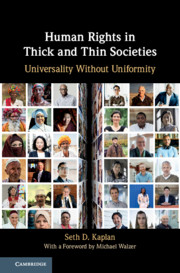Book contents
- Human Rights in Thick and Thin Societies
- Reviews
- Human Rights in Thick and Thin Societies
- Copyright page
- Epigraph
- Contents
- Figures
- Tables
- Foreword
- Preface
- Acknowledgments
- 1 Introduction
- 2 The UDHR: Flexible Universalism
- 3 Cultural Psychology’s Contribution
- 4 Thick versus Thin Societies
- 5 The Limits of Western Human Rights Discourse
- 6 Case Study: Male Circumcision in Europe
- 7 Case Study: Rwanda’s Gacaca Courts
- 8 Conclusion: A Return to Basics
- Bibliography
- Index
2 - The UDHR: Flexible Universalism
Published online by Cambridge University Press: 04 August 2018
- Human Rights in Thick and Thin Societies
- Reviews
- Human Rights in Thick and Thin Societies
- Copyright page
- Epigraph
- Contents
- Figures
- Tables
- Foreword
- Preface
- Acknowledgments
- 1 Introduction
- 2 The UDHR: Flexible Universalism
- 3 Cultural Psychology’s Contribution
- 4 Thick versus Thin Societies
- 5 The Limits of Western Human Rights Discourse
- 6 Case Study: Male Circumcision in Europe
- 7 Case Study: Rwanda’s Gacaca Courts
- 8 Conclusion: A Return to Basics
- Bibliography
- Index
Summary
- Type
- Chapter
- Information
- Human Rights in Thick and Thin SocietiesUniversality Without Uniformity, pp. 16 - 47Publisher: Cambridge University PressPrint publication year: 2018
- 1
- Cited by



